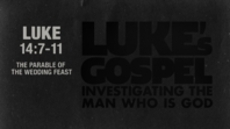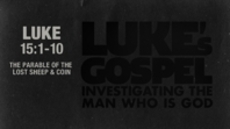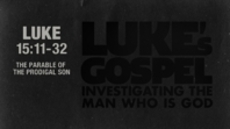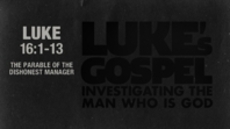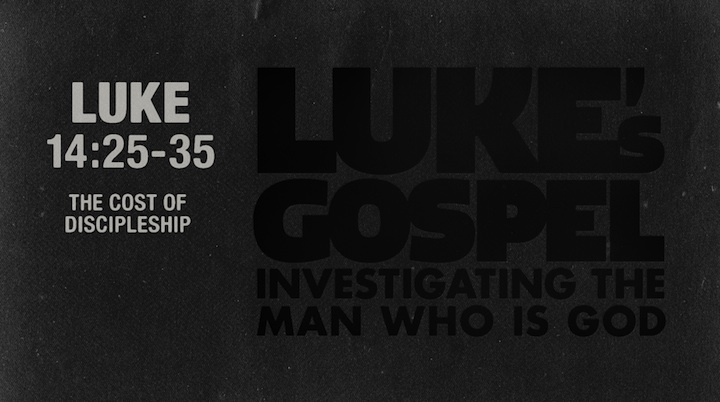
Can’t see the video? Download and install Flash to be able to view. Get Flash Here
Salvation costs you nothing, but discipleship will cost you everything. Salvation occurs in a moment, but discipleship takes a lifetime. Jesus asks whether or not you truly want to live a life of discipleship. If you are a disciple, do not quit. Everything that matters is hard. Everything that matters is costly. Do not quit. Don’t waste your life. Make your death count. Do not raise your hand unless you’re ready to see it through to the end.
25 Now great crowds accompanied him, and he turned and said to them, 26 “If anyone comes to me and does not hate his own father and mother and wife and children and brothers and sisters, yes, and even his own life, he cannot be my disciple. 27 Whoever does not bear his own cross and come after me cannot be my disciple. 28 For which of you, desiring to build a tower, does not first sit down and count the cost, whether he has enough to complete it? 29 Otherwise, when he has laid a foundation and is not able to finish, all who see it begin to mock him, 30 saying, ‘This man began to build and was not able to finish.’ 31 Or what king, going out to encounter another king in war, will not sit down first and deliberate whether he is able with ten thousand to meet him who comes against him with twenty thousand? 32 And if not, while the other is yet a great way off, he sends a delegation and asks for terms of peace. 33 So therefore, any one of you who does not renounce all that he has cannot be my disciple.
34 “Salt is good, but if salt has lost its taste, how shall its saltiness be restored? 35 It is of no use either for the soil or for the manure pile. It is thrown away. He who has ears to hear, let him hear.”
The Holy Bible, English Standard Version copyright © 2001 by Crossway Bibles, a publishing ministry of Good News Publishers. Used by permission. All rights reserved. Quotation information.
Luke 14:25–35
25 Now great crowds accompanied him, and he turned and said to them, 26 “If anyone comes to me and does not hate his own father and mother and wife and children and brothers and sisters, yes, and even his own life, he cannot be my disciple. 27 Whoever does not bear his own cross and come after me cannot be my disciple. 28 For which of you, desiring to build a tower, does not first sit down and count the cost, whether he has enough to complete it? 29 Otherwise, when he has laid a foundation and is not able to finish, all who see it begin to mock him, 30 saying, ‘This man began to build and was not able to finish.’ 31 Or what king, going out to encounter another king in war, will not sit down first and deliberate whether he is able with ten thousand to meet him who comes against him with twenty thousand? 32 And if not, while the other is yet a great way off, he sends a delegation and asks for terms of peace. 33 So therefore, any one of you who does not renounce all that he has cannot be my disciple.
34 “Salt is good, but if salt has lost its taste, how shall its saltiness be restored? 35 It is of no use either for the soil or for the manure pile. It is thrown away. He who has ears to hear, let him hear.”
Salvation costs you nothing, but discipleship will cost you everything. Salvation occurs in a moment. Discipleship takes a lifetime. Salvation is something that God does for you. Discipleship is something you do with God. Sadly, many only preach a life of decision, not a life of discipleship. The result is then people hit hard times, life doesn’t seem to be working, and they become disillusioned with Jesus rather than devoted to Jesus.
Jesus is not a salesman. He’s not trying to market anyone, sell anyone, con anyone in any way. In Luke 14:25–35, he’s going to talk about the cost of discipleship with some of the strongest, starkest language that he uses at any point during his ministry on earth. And he wants to be absolutely, brutally honest with us about what it means to truly be his disciple. A disciple is one who believes in Jesus, worships Jesus, serves Jesus, follows Jesus, obeys Jesus. Yes, believes in Jesus, but doesn’t just believe in Jesus, lives a life in light of that belief.
So Jesus is going to ask you whether or not you truly want to live a life of discipleship. And he’s going to essentially say the same thing four ways. And he’s going to continue to pound the same nail over and over and over and over, and here it is. That nail is this: If you are a disciple, do not quit. Do not quit. We live in a world filled with quitters. If it gets hard, quit. If it gets hard, it must not be God’s will. If it costs you something, then quitting is acceptable. People quit on God, they quit on their marriages, they quit on their children. Some of you continually look for the path of least resistance. “It’s hard, I need to find another way.” Everything that matters is hard. Everything that matters is costly. Everything that matters will hurt. And Jesus says, “Do not quit.”
Here’s how he says it. We read in Luke 14:25–27, “Now great crowds accompanied him, and he turned and said to them, ‘If anyone comes to me and does not hate his own father and mother and wife and children and brothers and sisters, yes, and, even his own life, he cannot be my disciple. Whoever does not bear his own cross and come after me cannot be my disciple.’”
No one teaches about love as much and as well as Jesus. No one demonstrates love like Jesus. And here Jesus uses the word “hate.” And he tells us that to be devoted to him means we must hate our mother, our father, our brothers, our sisters, our own children, and our own life.
What in the world is Jesus talking about? What is Jesus saying? He’s saying that a relationship with him needs to be in an altogether different category far above and beyond every other relational commitment we have. Jesus is worthy of full allegiance and devotion. No one can be as significant to us as him, no one. Darrell Bock, who wrote the gold standard commentary on Luke, he says it this way: “The call to hate simply means to love less. The image is strong, but it is not a call to be insensitive or to leave all feeling behind. Following Jesus is to be the disciple’s first love. This pursuit is to have priority over family members and one’s own life, which means that other concerns are to take second place to following Jesus.”
Jesus is here using the language of the Bible, where in the Old Testament, there were two brothers, Jacob and Esau. In Romans 9, God reveals to us that “Jacob I loved and Esau I hated.” God was good to both, but he chose to work through the family line of Jacob and put him in first position of priority. That’s exactly what Jesus is talking about here. The Bible does tell us to honor our mother and father. It’s one of the Ten Commandments in Exodus 20. It’s something that Jesus says as well. Ephesians 5 says that husbands must love their wives. Titus 2 says that wives should love their husbands. The Bible assumes that we’re, as image bearers of God, to gravitate toward loving affection of our children. But Jesus says that a devotion to him is in an altogether different category.
Practically, what this means is that you will face relational pressure as a disciple of Jesus to quit being his fully devoted follower from those that you love. This could be your parents telling you, “We don’t want you to be a Christian. We don’t want you to read your Bible. We don’t want you to go to church. We don’t want you to pray.” And in light of that, you have a decision to make: Which relationship is most important to me? Is it a devotion to Jesus or to my parents? The same can come from your own siblings, and family members have a way of making you feel particularly guilty, like you’ve betrayed the family. They turn their back on you, they ostracize you, the holidays are awkward, everyone’s uncomfortable, and you’ve created the problem because of your love for him. And some of you feel this. And this is your life.
In certain countries and cultures, this is actually a death sentence. If you decide to be a disciple of Jesus, you are committing social and familial suicide. Certain hardcore Muslim countries, as well as certain other cultures, as soon as someone in the family raises their hand to be a fully devoted disciple of Jesus, the family has a funeral and considers them dead, though they remain alive. And sometimes they will even kill them. They’ll call it an honor killing. And Jesus is saying if you’re really going to follow him, expect opposition, expect ostracism. Not everyone will approve of a life that is devoted to him.
And he says that this can even include your own children, who want you to bless their sin, pay for their folly, endorse their behavior, and you cannot because of love for him. This as well can include even a spouse. Some of you married as non-Christians. One of you has become a Christian, the other is not. And the unbeliever may be saying things like, “Do you have to go to church? Do you have to read your Bible? Do you have to pray? Do you have to share Jesus with our children? If you continue, I will divorce you.” And the answer must be, “I don’t want a divorce. I do love you. I’m not trying to be divisive, but you’re not the most important relationship I have. You are not God. You are not Lord. And if you make me choose, you will lose.”
Who is it that you would choose over Jesus? Who is it you have chosen over Jesus? You’re dating a non-Christian? Already made your choice. You’ve caved in to fear of man issues, gone quiet, secret, and dark with your faith so that no one would speak ill of you or oppose you? You’ve already made your decision. By all accounts, committing yourself to Jesus includes committing yourself to the kind of opposition that he endured.
You think of Jesus, he’s no hypocrite when he asks this—and let me say this. No other religious leader or teacher can make this request at all without being a cult leader. Jesus is the only one who can make this request. But his own family thought he was crazy, and at certain points in his ministry, came to take him home. His friends turned their back on him. Judas betrayed him. Thomas, Peter, others denied him. Jesus’ hardest days were lonely. Family, friends turned their back on him. And you can’t say, “I’ll follow Jesus unless I get treated like him.” To be a disciple is to walk in the footsteps of Jesus. And this includes all the way to your own death. Jesus says, “If need be, you have to pick up your cross and follow me.”
And it’s very disrespectful when people use this as a cultural euphemism for minor inconvenience, right? Your car breaks down, you got to take the bus to work. “Oh, I guess it’s my cross to bear.” That’s not what he’s talking about. Carrying a cross was literally a dead man walking, somebody who was convicted, condemned, on their way to death. You would carry your cross through town to be humiliated, shamed, scorned. You would carry it to your place of crucifixion, they would strip you naked or nearly naked, they would nail you to the cross. They would hang you up. Everyone would gather around, make fun, sport, and light of you. Your mother would bawl her eyes out. They considered you cursed of God ‘cause that’s what the Bible said. And you could hang there for days, sweating, bleeding, urinating, incontinent, weeping, with your own tears and blood and feces and urine dripping off your body into a pool beneath you. And Jesus says, “If that’s what it takes, that’s what I’m asking you to be willing to commit to.” And so many give so little for the one who gave so much.
We live in this day of easy believism. If you want to go to heaven, raise your hand for Jesus, do whatever you want, and he’ll say, “Well done,” at the end. Between your conversion and your resurrection is your discipleship. It’s growing, maturing in love, devotion, and commitment to Christ.
Jesus isn’t trying to sell you. Jesus isn’t like a salesman who gets you to commit to all the benefits and conveniently overlooks all the fine print of obligations. He shows up, he says, “I’m God. If you want to follow me, people are gonna hate you and you might die.” That’s the cost of discipleship.
And there was a day when people understood this, perhaps a little more intently than we do today, because today it’s a consumer culture. You don’t like this church, you go to that church. You don’t like this preacher, you go to that preacher. You find someone to give you what you want, not what you need. How many churches have you been to? How many decisions have you made? How many paths of least resistance have you chosen? How many times have you already quit? How many ways have you already quit? How many people have you blamed for your quitting?
There’s one missions organization that, when they would ship missionaries out around the world, they would pack all of their belongings in a coffin. And it was a very clear way of saying, “I’m gonna die. I’m gonna go talk about Jesus until I die. That might be a short while, that might be a long while, but it will happen.” And they would write a final farewell letter and leave it to someone they loved, leave it with the missions organization. And upon their death, it would be delivered and read by that person.
I sometimes wonder if that wouldn’t be a good exercise for us all. You’re going to die. You are going to die. It may be soon, it may be a while, but you’re gonna end up in a box. It’s inevitable. So don’t waste your life. Make your death count. Don’t quit! Don’t quit on Jesus. Don’t quit on your spouse. Don’t quit on your kids. Don’t quit on our church. Don’t quit on the opportunity God sets before us. Do not quit. Live your life in such a way that, when you do die, at least your children are proud and your grandchildren have something to talk about. There’s something worse than dying, and that’s a wasted life.
There’s one particular young gal, she filled her coffin, went on her mission trip. Here’s the letter that she left for her pastor to read to the congregation that she was a part of. “Dear Pastor, you should only be opening this letter in the event of my death. When God calls, there are no regrets. I’ve tried to share my heart with you as much as possible, my heart for the nations. I wasn’t called to a place. I was called to him. To obey was my objective. To suffer was expected. His glory, my reward. His glory, my reward. The missionary heart cares more than some think is wise, risks more than some think is safe, dreams more than some think is practical, expects more than some think is possible. I was not called to comfort or to success, but to obedience. There is no joy outside of knowing Jesus and serving him. I love you and my church family. In his care, Karen.” You’re gonna die. Don’t quit. Do not quit.
This is a brutal day for me. I keep thinking of all the people in my fifteen years of ministry at this church who just quit. They just quit. They quit reading their Bible, they quit praying, they quit repenting, they quit serving, they quit giving, they quit community. Eventually, they quit Christ, they quit their marriage, they quit their kids. And I’ll tell you, not one of ‘em is happy. Not one of ‘em is pleased. And not one of ‘em is going to leave a legacy that’s admirable.
Jesus’ second point: do not quit! You’ll see a theme develop here very quickly. Luke 14:28–30, “‘For which of you, desiring to build a tower, does not first sit down and count the cost, whether he has enough to complete it? Otherwise, when he has laid a foundation and is not able to finish, all who see it begin to mock him, saying, “This man began to build and was not able to finish.”’” Jesus says, “Before you commit to something, do your homework, make a plan.”
Some of you have committed to far too much. We’re not talking about seeing through to completion everything you volunteer for. Some of you have got to learn to say no. You’ve got to get over your fear of man. It’s better to do one or two things to completion than seven things to incompletion. Jesus says, “Before you start something, do your homework. Make sure you got a plan. Otherwise, you’ll be like someone who says, ‘I’m gonna build a building or put an addition on my home. Halfway through, lo and behold, we’re out of money. We didn’t make a budget. We didn’t consult an architect and now we’re fools who are embarrassed ‘cause we can’t get a return on that investment, we can’t occupy that property, and now it just serves as a monument to our folly.’” The landscape in all major American cities is now littered with this kind of monument. Ran out of money.
Do not raise your hand unless you’re ready to see it through to the end. Do not raise your hand unless you’re ready to see it through to the end. Some of you need to say yes less. And all of us need to do our homework. We need to evaluate our life. “What am I capable of? What can I afford? What can I do? What are my priorities? If I raise my hand, I need to see it through to completion.” Do not quit. Do not quit.
Otherwise, you’re like a woman who is all about a wedding, but not about a marriage. You’re like a woman who really enjoys her wedding day, and then once it’s completed, tells her groom, “We’re getting a divorce today.” The groom’s bewildered. “What do you mean?” “Well, I look good in white, I really enjoy getting my photo taken, I have an affinity for cake, and it was nice to see everyone, but fifty years seems like a long time.” And see, the metaphor of the Bible continually is that we’re like a bride and Jesus is like our groom, and some of us just want to have a wedding, but we don’t want to have a marriage. Getting married is easy. Fifty years is hard. Right? You raised your hand for Jesus at youth camp, you came forward, got baptized at Mars Hill, you prayed the sinner’s prayer. Great, you got married. Now it’s fifty years of working it out.
Otherwise, you’re like a soldier, you sign up, you get your gun, you get your uniform, you go to the battlefield, you realize, “Oh, people could get hurt,” and you go home. And all the guys are looking at you like, ”What are you doing?” “Well, I look good in green and, you know, I thought it’d be good to hang out with the guys, but, you know, combat? I wasn’t signing up for that.” Yes, you were. When you put on the uniform, you were going to war. That’s the agreement.
And Jesus is making this clear up front. It’s about the rest of your life. Jesus doesn’t want a percentage of your time, a percentage of your money, a percentage of your devotion. He wants all of you, all of you, all the time. No one makes the kind of request that Jesus does and no one has the right to. Jesus says if we do not count the costs, we will be those people who get halfway into our ministry, halfway into our business, halfway into our marriage, halfway into our family, and quit. And it’s an embarrassment. And don’t blame everyone else. Don’t make excuses. Own it and do not quit. Do not quit. And don’t quit on Jesus and don’t quit as a Christian. ‘Cause, see, as we fight, friends, we fight for one who loves us and we fight to share his love.
Jesus’ next point: do not quit! Luke 14:31–33, “‘Or what king, going out to encounter another king in war, will not sit down first and deliberate whether he is able with ten thousand to meet him who comes against him with twenty thousand? And if not, while the other is yet a great way off, he sends a delegation and asks for terms of peace. So therefore, any one of you who does not renounce all that he has cannot be my disciple.’”
Jesus uses another analogy, a parable. It’s like a king who gets mad at another king and another nation, and declares war. Says, “That’s it, we’re going to war.” Brings together all of his generals, says, “Okay, what’s the battle plan?” They say, “The plan is to surrender.” “Why would we surrender?” “Well, king, you should have called us first. They have twenty thousand soldiers, we have ten thousand. That means we’re going to lose.” And it’s an embarrassment. It’s a shame. It’s a humiliation. Some of you have raised your hand, “I’m going to do this. I’m going to lead that. I’m going to serve here. I’m going to see this through to completion.” You didn’t really do your homework and you’re gonna quit.
Some of you already have. What have you already quit on? All right, it’s that time of year. How’s that gym membership going? How’s that New Year’s resolution rolling? What have you already quit? Is your life a series of motivated moments and quitting? Disciples don’t quit. One of the root words for “disciple” is the same root for “discipline.” A disciple is disciplined. Getting married is easy. Staying married is hard. Gettin’ saved is easy. Being sanctified is hard. Makin’ babies is fun. Raising ‘em is work. And that’s life. That’s the way it is. And Jesus isn’t gonna lie to any of us and say, “Come to me and it’ll be easy.”
I heard the dumbest testimony I’ve ever heard recently on the radio, and I’ve heard a lot of dumb testimonies. It was so bad, I almost vomited so hard that I almost triggered my airbag. It was literally this: “My life was horrible and painful, and then I met Jesus and now everything’s perfect.” That’s not true. You didn’t meet Jesus. You met Jack Daniel’s and you are not paying attention to reality. A true testimony is this: “My life was pretty hard and I met Jesus. It’s gotten a lot worse, but he’s worth it and one day I’ll be with him.” That’s a good testimony. Jesus doesn’t fix everything. Jesus just makes the death purposeful. He makes the suffering and the pain and the hardship and the sacrifice meaningful.
It’s a lot like a battle, Jesus says. We have a real enemy, there’s a real war, there’s real conflict, there are real casualties, there are real quitters. Don’t be one of them. I was in Turkey last year and was studying the topography and geography and history of the region in preparation for a trip we’re doing and some books of the Bible we’ll get into in the ensuing years. And I got captivated with one area. It’s in the Bible. It’s called Galatia. I wanted to know, how did the Galatians hold their ground for so many generations? They were in an indefensible plain. They have no natural fortification, but they held their ground. How did they do it?
And the archaeologist and the historian and professor who was with us, he said, “Well, they fought differently than most.” He said, “When they would go to battle, they would bring their wives and children with them. And the soldiers would kiss their wife and kiss their sons and kiss their daughters and say, ‘Okay, Daddy’s going to go to war with those guys. And if Daddy loses, they’re gonna change your last name. You girls are gonna be marrying their sons, and wife, I fear what they’re going to do to you.’” And then he would go to war. And if he won, he got to take his family home. And if he lost, somebody else took his family home and did whatever they wanted. And those guys didn’t lose a battle for hundreds of years because you fight differently when you fight for someone you love and a kingdom you belong to. You just fight differently.
And our stupid replacement of this is really video games. And I was thinking about it today since I’m in that mood. Video games are not sinful, they’re just stupid. And they’re stupid in this way. Young, particularly men, and now women are joining it, they want to get on a team, be part of a kingdom, conquer a foe, and win a great, epic battle. So they do it with their thumbs and it doesn’t even count. Nobody’s really liberated. The Taliban is not really conquered. Women are not really freed from oppression. Generations are not really changed. It’s all fake. It doesn’t count.
You want to do something? Get off the couch, unplug the electronics, give your life to Jesus, find some other guys, and do something that actually matters. Leave a legacy for women, children, generations, not just the high score on some stupid game. [applauding] It’s amazing. A whole world filled with guys who want to be on a team, go to a war, defeat an enemy, and save a princess. That’s the story of this book, the Bible. And if you want to be part of that kingdom, you got to get off the couch and follow that king. And you do not quit. You fight differently when you fight for ones you love, a kingdom, and a king.
Some great battle leaders, they would historically have their men row to the shore of a place they wanted to investigate and conquer, and then the good generals would light the boats on fire. “There are two options, men: forward or death.” That has to be the attitude that we have. That has to be the attitude we have ‘cause the default mode of the human heart is selfishness, laziness, quitting. And some of you are here and you’ve already quit. Don’t. And some of you would want to say you’re a Christian and not see it through to completion. And let me just say this. All of the slots for hypocrite are already filled. All of those positions are filled. We’re not lacking hypocrites. We’re lacking disciples.
Jesus’ next point: do not quit! Luke 14:34–35, “‘Salt is good, but if salt has lost its taste, how shall its saltiness be restored? It is of no use either for the soil or for the manure pile. It is thrown away. He who has ears to hear, let him hear.’”
Now, in that day, their salt was a bit different than ours. Their salt came from a place called the Dead Sea. I’ll show it to you. I believe it’s the lowest point on earth. And there the salt was commingled with other elements, so they didn’t actually have pure salt. Over time, the salt could remove itself from the other compounds and then you’re left with salt that was not salty. Jesus says, “Well, what good is that?” ‘Cause, see, salt is to preserve, salt is to enhance flavor. And if salt lost its saltiness, you’d throw it on the manure pile and it would help to instigate a good fertilizer.
Jesus says we’re supposed to be like salt. We’re supposed to be preserving for his kingdom. We’re supposed to enhance life for others. If nothing else, he’ll throw us on the manure pile and use us for fertilizer to do something good. And that some of us are just worthless. Some of us are worthless. And I know you’ll immediately respond to that negatively. “No, no, no, I’m like a snowflake. I’m one of a kind. I’m special in God’s eyes. He loves me.” He does love you and you’re worthless. “No, but I’m made in his image and likeness, so I have value.” You are made in his image and likeness, and you do have value, which makes it even worse that you’re worthless. Jesus gives you his image and likeness. Worthwhile living is something you have to commit yourself to.
So how’s it going? Does your life make a difference? Does it count? Who are you serving? What are you giving? Where are you pouring yourself out? What kind of legacy will you leave? It really does matter how you live your life. It’s not just accept Jesus and go to heaven when you die. It’s being a disciple along the way. That’s really important. And so many Christians do so little for the one who gave so much.
How about you? How about you? How’s it going? How’s your Bible reading? How’s your prayer life? How’s your repentance of sin? How’s your Spirit-filled zeal and devotion? How’s your financial giving? Where are you serving? Who are you helping? What are you accomplishing? What are you completing? Or have you already quit?
And the truth is you’re not going to make it alone. You need to be in community. The truth is you and I will not make it to the end alone. We’ll not see this life of opportunity and obligation to completion all by ourselves. We just won’t. This is where community and God’s people and the occasional stinging rebuke of God’s Word helps to purify our motives and to point us in the right direction. I’ve seen it over and over and over and over and over and over and over. Where did they go? They’re not coming anymore. Oh, now they’re not even walking with Jesus. Oh, now their life is falling apart. Oh, now their marriage is falling apart. Oh, now their children are paying the price. Eventually, their grandchildren will as well. Don’t quit. Do not quit.
And Jesus is no hypocrite. Jesus did not quit. Jesus accepted that his family did not understand him. Now, they came around and I pray your family would too if that’s your story. Jesus accepted the opposition, ostracism, criticism. Jesus shed his blood and died to accomplish something. His death mattered. It was for our salvation. Jesus knew the price he would have to pay. He counted the cost and he paid it. He’s in Gethsemane, sweating drops of blood, knowing the price that he will pay. And he goes to the cross nonetheless. And he keeps his saltiness all the way to the end. He doesn’t give up. He doesn’t give in. He dies, he rises, he loves, he saves, he heals, he forgives. And he says, “If you want to be my disciple, you need to follow me and be willing to endure a measure of what I’ve endured.”
And some of you have never heard this, and many of you have never seen this. All you were told was, “God loves you, do you want a better life? Say yes to Jesus.” You weren’t really told the truth. So don’t get disappointed and frustrated with Jesus. Get disappointed and frustrated with the person who didn’t tell you the whole truth about Jesus. And don’t quit, but continue. There’s dignity, honor, legacy for the disciples of Jesus.
You’re gonna die. I’m gonna die. We’re gonna die. I’m not looking to die, but if it comes, I want it to count. I want your life to count. I want your death to count. I want your legacy to matter. And what I love about Jesus’ words is that they are brutally honest. It seems unconscionable or perhaps just miraculous that this man, with this message, would gather billions of people. And that’s what he’s done.
And this, I believe, prophetic word comes to us from the Bible, from Jesus, and he is saying to continue, to not quit, but to continue. And he gives us this word today at the best point in the history of our church. Fifteen years ago, a little Bible study met at my house. It’s now called Mars Hill. You know what? We’re not behind on budget. We beat budget. We didn’t shrink last year. We grew. We didn’t have less community groups, redemption groups, baptisms, weddings, children. We had more. Every single campus is growing. There is unity across the entire leadership. It’s actually fantastic. The annual report that is now available in print or online, you can read it, it’s unbelievable. It’s just a miracle after a miracle after a miracle after a miracle.
And what can happen is we can think that we’ve accomplished something. Momentum is either forward or backward. You’re either growing in faith and Christ, or regressing away from faith and Christ. And what could kill us at this point, this window of opportunity—most of you don’t know it because this is the only church you’ve ever really known, but we have a window of opportunity that God has opened up for us to see the kind of grace that one day they write a book about. They write a book about showing how Jesus showed up at an unlikely place, among an unlikely people, and did an unlikely thing, and that we got to be a part of it. This is—this is it for me. This is the window of opportunity that I see God has opened for us as a people. I’m more motivated, excited than I’ve ever been.
And what could kill it is this: If you have disciples and if you have non-Christians, everything will be fine, but what kills it are all the Christian consumers, all the people who don’t go to community group, don’t serve, don’t give, don’t become members because the bar is set too high. We intentionally set the bar high.
You want to be a member of this church? You got to read a huge book with a thousand footnotes. Some of you say, “I’m not gonna read that book.” Well, then you’re not gonna be a good church member. If all it takes is footnotes to scare you away, you’re not ready for war.
You want to get married? You’re gonna have to go through a premarital process, declare all your sexual sin and history, submit to spiritual authority, and someone may tell you no. And you have to be okay with that because getting married is easy and fifty years of joy is hard.
You want to do something here? The bar is set high because this is a kingdom operation, this is a kingdom mission. And Jesus says if you really want to raise your hand, make sure you’re good to the end.
It’s wonderful that we have hundreds of weddings a year. I hope the day doesn’t come when we have hundreds of divorces. It’s wonderful that we have over 1,500 children. I pray that they don’t grow up to hate Jesus because of the way we conduct ourselves. I hope we don’t create just another generation of Christian consumers who can sing Christian songs and give Christian answers, but don’t live Christian lives.
And it’s Christian consumers that kill a church that’s in a position like ours. There are only roughly forty churches in America out of 400,000 that are as big as we are. It’s not all about the numbers, but it is about counting the cost. And there are some fantastic, amazing disciples of Jesus here. They give, pray, serve, care, and they are part of the miracle of God’s grace. There are non-Christians who have met Jesus or are meeting Jesus somewhere in process, and in the middle, what can happen is the Christian consumers take all the resources from the disciples and there’s nothing left for the lost people. I have been saying this for fifteen years.
And now we’re at the point that you have to make a decision: producer or consumer, disciple or disappointment, contributor or consumer. Are you in or are you out? And it’s not just getting an emotional hoo-rah right now. You’ll answer that question in sixty years with the fruit of your life. And Jesus says you’ve got to pick your team, you’ve got to serve your God, you’ve got to determine your life, you’ve got to select your fate, you’ve got to pick up your cross, and it’s all about dying. It’s all about dying.
Father God, I pray for us individually and corporately as a people. Jesus, we know that hard words produce soft people and that soft words produce hard people. And in a day when there’s just a lot of soft words, “We’re all deep down good in our hearts and we tried our best and there are no failures and God works it all out and it’s gonna be okay.” Jesus, what a bunch of garbage. What a bunch of religious nonsense. What a bunch of proof-texting and idol-pleasing and self-glorifying. Jesus, please help us to really consider and count the cost, to not take the path of least resistance, but to take the path of most opportunity, to not raise our hand for everything, but raise our hand for the only things that you would call us to. I pray for those quitters among us, God. They’re cowards, they’re lazy. They don’t like to hear those words, but they fit so well. God, through repentance, we don’t need to be cowards. We don’t need to be lazy. God, for those that we’re just another church on their journey to find a place to criticize, God, I pray right now that in Jesus’ name you would capture their hearts, you would show them their religious pride, that you would devastate their independence and judgmentalism, and that you would show them that they’re criticizing disciples who are serving them rather than being among their number. God, thank you for the grace that you’ve poured out on this place. Mars Hill is a miracle and it’s an opportunity. We have not finished anything. To use Jesus’ language, the war is not won, the tower is not built. We’re on our way, but we’re not there. And so, God, we pray for a sobriety, steel in our spine, love in our heart, courage in our voice to continue, to continue being about you, by the grace that you give. God, I pray for those who have already made up their decision to quit, those who will hear these words and just tap out and walk away. God, I pray you would convict them that Jesus’ words are words of life, and if they would just die, they could experience a whole new life. In Jesus’ name, amen.
[End of Audio]
Note: This sermon transcript has been edited for readability.

Don't Quit
February 20, 2011
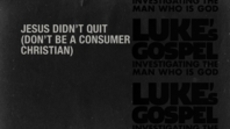
Jesus Didn’t Quit (Don’t Be a Consumer Christian)
February 20, 2011
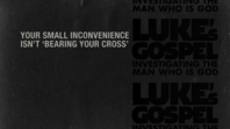
Your Small Inconvenience Isn’t ‘Bearing Your Cross’
February 20, 2011
